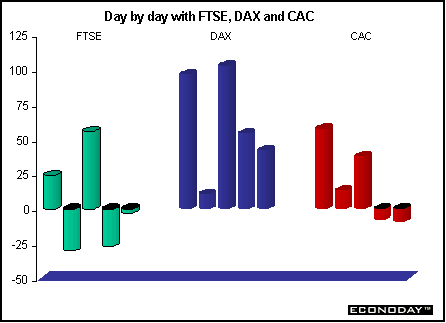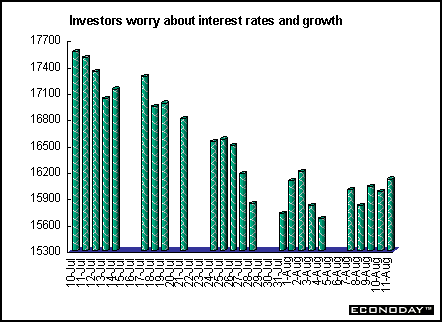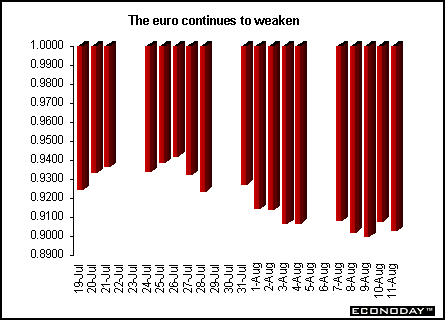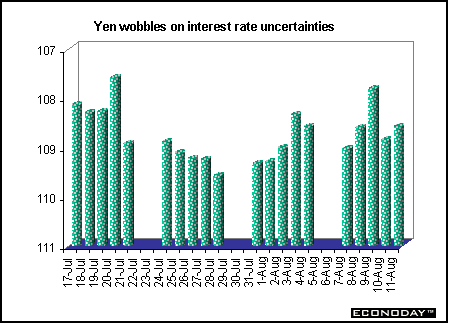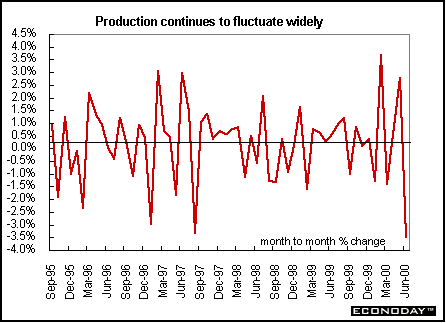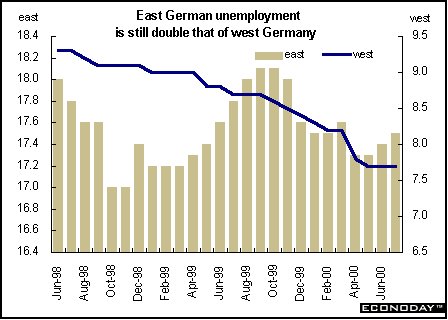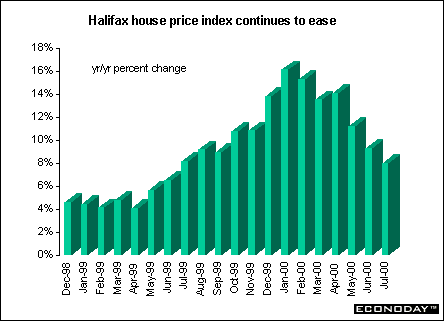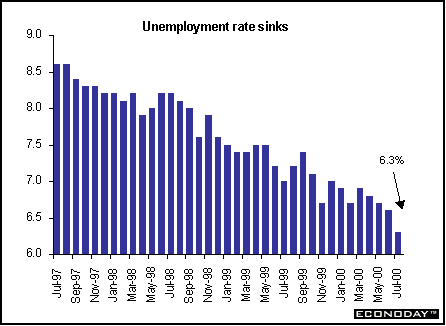| Previous Articles |
|
Hazy lazy days of summer, international style
Britain and Europe
The DAX London markets drifted along with no sense of direction, waiting for the mid-week release of the Bank of England's quarterly inflation report. The Bank of England said inflation was likely to rise above its 2.5 per cent growth target if domestic demand failed to slow and if the pound continued to weaken. (See Central Banks below) The FTSE 100 ended the week up a mere 21 points or 0.33 percent at 6384.50. It was pretty much the same story with the Paris CAC. Investors shifted between the TMTs and old economy stocks. Favorable news on French inflation helped boost the market, which closed up 91.65 points or 1.42 percent at 6553. Asia In Japan, sentiment fluctuated as conflicting advice swirled whether the Bank of Japan should drop its zero interest rate policy (ZIRP) at its Friday meeting. The Nikkei 225 hesitantly picked up ground as strong machinery orders data were released and first quarter gross domestic product was revised upward. (See indicator scoreboard below) Investors appeared to have been preparing for higher rates since monetary policy makers met last on July 17. Since that time, the Nikkei has dropped almost 7 percent.
The Nikkei ended the week higher as the market shrugged off concern the Bank of Japan's policy board might raise interest rates. There had been talk since last month that the central bank might end its policy of driving short-term interest rates to zero. A week of heated political debate fueled speculation further about Friday's meeting. But analysts said the market was prepared for a rate rise and such a move would end weeks of uncertainty. The Bank of Japan announcement that they had raised interest rates was made after the markets had closed. The Nikkei 225 rose 450.14 points or 2.87 percent to end the week at 16,117.50. Currencies
On Wednesday, the euro fell to $0.8961, an 11 week low (the record low of 88.50 cents occurred on May 19, before the euro rebounded to $0.9699 in June). Explanations for the euro's lingering weakness encompass questions about the European Central Bank's credibility, lack of tax and labor reform in the European Monetary Union, lagging restructuring and productivity growth, and the pace of the U.S. expansion eclipsing EMU economic growth. According to many economists, the euro should be stronger. The growth divergence argument isn't sufficient to justify the euro's 23 percent decline since its start. Neither is the gap between benchmark U.S. and EMU interest rates, which has narrowed to 225 basis points from 275 in the past 10 months. However, the wider gap should be good for the dollar as higher returns on dollar deposits attract investors. Growth reports show the EMU economy is expanding briskly. While it is still trailing the United States, it is expected to catch up as the U.S. slows, economists say. The yen vacillated as traders tried to figure out what the Bank of Japan would do at their Friday meeting. After the bank raised interest rates to 0.25 percent, relief replaced uncertainty. There was also relief that the bank had exerted its independence. Market players think that it would be have been bad for the yen if it had not exerted its independence.
The dialogue between Central Bank Governor Masaru Hayami and the Ministry of Finance grew more heated last week when Hayami reiterated that it was time to end 18 months of near zero rates because in his view the economy is recovering. Hayami's statements sparked renewed criticism from Ministry of Finance officials along with economists and political leaders, who are concerned a rate rise would be premature. A group of politicians and economists sent an open letter to Hayami asking that he not raise the benchmark lending rate at Friday's meeting. (See below) The yen declined in reaction to the infighting. However, Hayami has argued that keeping rates low now may require more aggressive increases later, because virtually zero borrowing costs encourage state spending, delay reform at debt-laden companies, and hurt people who rely on interest from savings for income. Those who oppose the move argue Japan's economic recovery is still too shaky to handle higher rates. Central bank activities The bank also has expressed fears that over reliance by corporations on easy money could blunt their international competitiveness at a time when drastic restructuring is needed to secure long term economic growth. Yet government officials worry that higher rates would stifle the incipient economic recovery and possibly set off deflation, or a sharp decline in prices. The central bank said earlier this week that deflationary fears have abated (despite continuing price declines). The rate hike will make it more costly for the government to borrow money to feed massive spending projects that have kept Japan's economy from going under. The European Central Bank in its monthly publication expressed a hawkish view on inflation. This was interpreted to mean that interest rates probably will rise soon, possibly as soon as their next meeting, which is scheduled for August 31. The European Central Bank said that the euro's slump and faster economic growth threaten to push up inflation in the EMU, reinforcing expectations the bank will raise interest rates. The euro's swoon against the dollar is driving up the cost of imported goods. The ECB's policy setting refinance interest rate is currently 4.25 percent, 225 basis points below that of the United States. The Bank of England in its quarterly Inflation report acknowledged that inflation could rise above its 2.5 percent inflation target, especially if the pound sterling weakens and drives up import costs. However, the British economy shows few signs of overheating for now, although inflation could exceed the government's target in two years if consumer spending and wage growth accelerate. The Monetary Policy Committee did not raise interest rates at their monthly meeting on August 2 and 3, nor did the report indicate that they intend to do so when they next meet in September. The Bank's primary policy making interest rate is currently 6 percent. Indicator scoreboard
July seasonally adjusted unemployment rate slipped down to 9.5 percent from 9.6 in June. In west Germany, the rate remained at 7.7 percent while east German unemployment rose to 17.4 percent from 17.3 percent in June. were up 34 percent and imports jumped 38 percent when compared with last year.
June unadjusted merchandise trade surplus rose to DM13.0 billion from the DM7.4 billion May surplus posted, but was lower than the DM13.3 billion surplus in June 1999. Exports rose 12.2 percent when compared with last year, while imports rose 14.7 percent. The June seasonally adjusted trade surplus rose to E6.1 billion from May's E4.3 billion surplus and from the E6.0 billion surplus of a year ago. June seasonally adjusted exports were up 17.7 percent compared to a year earlier. Imports were up 20.0 percent on the month. July final consumer prices for the six months to July rose at an annualized rate of 2.1 percent, the same as in June. Seasonally adjusted consumer prices rose 0.2 percent in July and were 1.9 percent higher than a year ago. France - July unadjusted preliminary consumer prices declined 0.2 percent as seasonal discounts and cheaper fresh food offset a largely unexpected energy price increase. The seasonally adjusted CPI rose 0.2 percent on the month, or an annual increase of 1.8 percent. Core inflation, which excludes administered prices and volatile sectors like food and energy, was flat on the month leaving the annual rate at 1.2 percent. Italy - June workday adjusted industrial production fell 0.7 percent on the month but rose 4.6 percent when compared with last year. Consumer goods output fell a seasonally adjusted 0.6 percent on the month but rose an unadjusted 3.2 percent on the year. Investment goods output fell an adjusted 1.0 percent on the month, while climbing an unadjusted 6.3 percent on the year. Spain - July consumer price index jumped 0.6 percent despite flat energy prices and rose 3.6 percent when compared with last year. The monthly increase was the highest since January 1995 when the CPI rose 1.0 percent. The increase was due to higher food, tourism and hotel costs. Core inflation, excluding energy products and non-processed food, rose 0.5 percent on the month and 2.5 percent when compared with last year. Britain - July Halifax house prices rose 0.3 percent on the month, reversing June's decline, while the annual rate fell for the third month in a row to 8.0 percent after June's 9.2 percent increase. Over the past six months the annual rate of increase has dropped from a peak of 16.0 percent in January. The Halifax said the housing market has been softening in recent months.
June manufacturing output rose 0.2 percent on the month and 2.1 percent on the year. The monthly gain was attributable to increased electrical and optical industries output. Car production, however, was lower in June than in May. May data were revised up. It is now estimated that May manufacturing output rose 0.5 percent rather than 0.4 percent as initially reported. In the three months to June, manufacturing output rose 0.4 percent on the quarter and was up 1.8 percent on the year. Asia First-quarter (January to March) real gross domestic product was revised to an increase of 2.5 from a preliminary 2.4 percent gain after two consecutive quarters of declines. On an annualized basis, GDP rose 10.3 percent after the preliminary reading of 10.0 percent. Private consumption was revised down to a 1.7 percent increase from the preliminary 1.8 percent gain. Private investment in housing was unchanged, up 6.6 percent, while investment in equipment and facilities was up 4.8 percent, revised from a preliminary jump of 4.2 percent. July bank lending fell 4.5 percent when compared with last year after declining 4.6 percent in June. City bank lending fell 3.4 percent in July, long-term credit bank lending fell 21.7 percent; trust bank lending fell 5.3 percent; regional bank lending fell 0.3 percent; and second category regional bank lending fell 7.0 percent. Foreign bank lending fell 19.7. July domestic wholesale prices rose 0.2 percent and were up 0.3 percent on the year. Electric power, gas and water prices rose while electrical machinery declined. The export price index decreased 0.9 percent on the month in terms of contract currencies. In yen terms, it was up 0.3 percent on the month but down 6.9 percent on the year. The import index was up 1.4 percent in terms of contract currencies. It rose 2.7 percent in yen terms and was up 2.3 percent from the previous year. Seasonally adjusted value of machinery orders, excluding purchases by power utilities and shipbuilders, rose 3.1 percent in the three months ended June 30, boosted by a 14.4 percent June increase. June's machinery orders posted the biggest monthly increase in almost four years.
Australia - The July seasonally adjusted unemployment rate fell to 6.3 percent from 6.6 percent in June. Employment rose by 75,700 jobs. The increase in employment reflects ongoing strength in the Australian economy and a tightening in the labor market. Seasonally adjusted workforce participation rate, or the proportion of working age persons at work or actively looking for work, rose to 63.9 percent in July from 63.7 percent in June. The trend estimate for unemployment, which takes other irregular factors out of the seasonally adjusted data, was 6.5 percent in July, down from 6.6 percent in June.
BOTTOM
LINE Aside from the Japanese drama, investors will be focusing in on the August 22 Federal Reserve Open Market Committee Meeting even though no rate increase is anticipated. The consumer price index will, as usual, be searched for inflationary, and therefore, policy moving clues.
Release dates are subject
to change. |
|||||||||||||||||||||||||||||||||||||||||||||||||||||||||||||||||||||||||||||||||||||||||||||||||||||||||||||||||||||||||||||||||||||||||||||||||||||||||||||||||||||||||||||||||||||||||||||||||||||||||||||||
